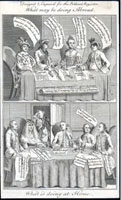The Privy Council and Cabinet

The mixed constitution produced by the Revolution Settlement meant that there was no separation of powers in the British government. Authority was exercised by the King-in-Council or by the King-in-Parliament, but neither the monarch nor the Privy Council nor Parliament could unilaterally impose measures. All executive authority ostensibly resided in the King-in-Council, meaning the King acting with the advice and consent of his Privy Council, an ancient body that could trace its history to the earliest days of the monarchy. Through the Privy Council and its committees (such as the committee on colonial affairs, revived in 1714), the King appointed and removed colonial officials, assented to or rejected laws passed by colonies assemblies, issued royal proclamations, and heard and resolved colonial disputes.
Over the course of the eighteenth century, however, the Privy Council lost much of its authority to the Cabinet or Cabinet Council and then to the "inner Cabinet." Although comprised of the ministers of state, along with a number of members of the King's household and senior Church officials, the inner Cabinet—made up of a much smaller body of ministers—evolved to manage executive affairs. It included the First Minister (later called the Prime Minister) and the Secretaries of State, while other members varied over time with changes in ministries and the monarch. The level of its influence, too, changed over the colonial period, depending on the strength of the First Minister. Sir Robert Walpole, for example, famously proclaimed that he was "against having the Cabinet; no good ever came from them," and proceeded to manage executive and legislative political affairs through a small group of ministers who were, crucially, all also members of Parliament. Cabinets might have advised the Crown but any important policy measure had to be assured of support in the Commons and Lords before it was even presented to the King. Even though George III (and his uncle, the Duke of Cumberland, early in George III's reign) exercised much more influence through the inner Cabinet, royal authority was mostly a shadow by the 1760s.
The political reality of the eighteenth century was that Parliament acquired most, if not all, control over executive affairs, including those involving the colonies. Therefore appearances can be deceiving if one relies too much on the language of "the King's government" or the "royal prerogative." For example, in July 1765, the Cabinet reported to George III that while the Board of Trade found the Virginia Resolves were indeed an attack on the British constitution, it was a matter too important not to be left to Parliament. Lord North felt the same way about determining a response to the Boston Tea Party when Crown lawyers informed him it was beyond the King's authority to deal with it as an executive matter. North himself was at the center of the capture of the final major remnant of the royal prerogative when his ministry, which continued to be supported by the King, disintegrated in the wake of Cornwallis' surrender at Yorktown in 1781.





